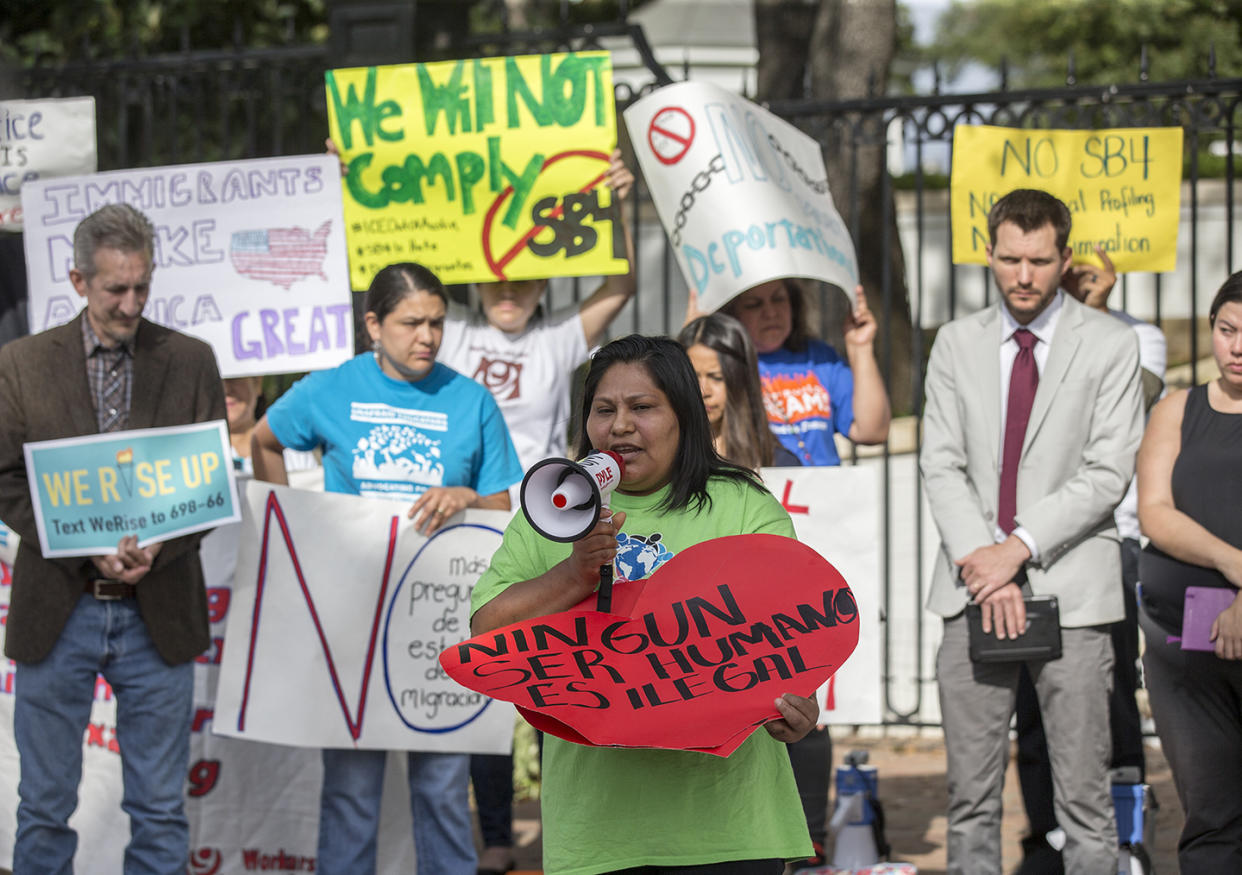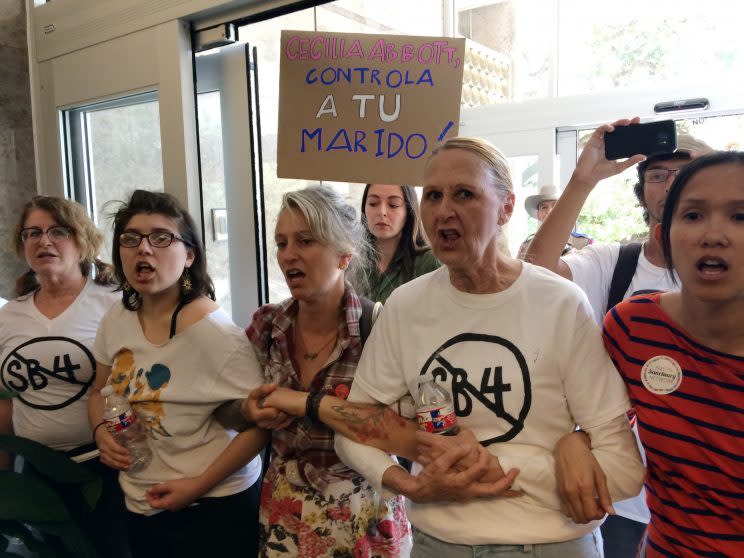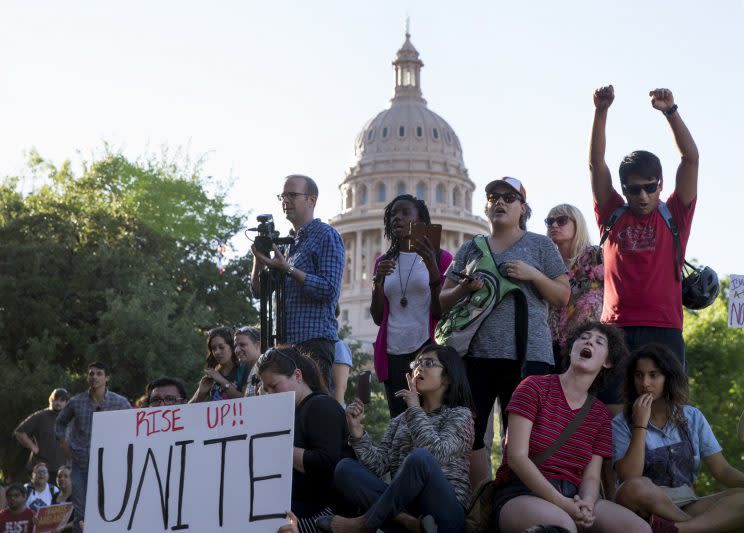Texas bans sanctuary cities, braces for backlash

Texas Gov. Greg Abbott faced a fierce backlash Monday, hours after signing into law a state ban on sanctuary cities that is widely opposed by law enforcement officials, immigrant rights advocates and religious organizations.
Abbott signed the controversial ban — which seeks to punish Texas cities that refuse to enforce federal immigration laws — during an unexpected Facebook Live broadcast Sunday evening. Not long after, immigration advocates had gathered outside the governor’s mansion in Austin, where protests continued well into the next day.
The crowd keeps growing. Immigrants & refugees are #HeretoStay #SB4IsHate pic.twitter.com/EaZeXzplGp
— Julieta Garibay (@dreamelder) May 8, 2017
Now the country’s harshest antisanctuary law, the Texas ban not only permits local law enforcement officers to request immigration papers from anyone they suspect of being in the country illegally — a practice that critics argue basically amounts to encouraging racial profiling — it also makes so-called sanctuary policies illegal. Local sheriffs and police chiefs who refuse to comply with federal immigration detainer requests now face hefty fines or even jail time, while elected and appointed officials may be subject to removal from office.
U.S. Attorney General Jeff Sessions has taken a tough stance against self-declared sanctuary cities, threatening to withhold federal grants to municipalities that don’t fully cooperate with immigration enforcement. On Monday, his office praised Abbott for signing the Texas bill into law.
“The Department of Justice is committed to promoting a lawful system of immigration and the attorney general commends Gov. Abbott for his work to end the lawlessness of sanctuary cities,” DOJ spokesperson Ian D. Prior said in a statement.
More than 200 faith leaders from across Texas signed a letter condemning the governor for approving the law. On Twitter, critics including Colombian-American actor John Leguizamo, attempted to rouse support for a boycott of the Lone Star state.
@gebemartinez @georgelopez @SofiaVergara @JLo @chrisrock @pitbull @Madonna @cher @MarkRuffalo @dianeguerrero__ @MsJackieCruz I'm canceling my tour of Texas! And asking my friends and Fam who were going to visit not to!
— John Leguizamo (@JohnLeguizamo) May 8, 2017
For weeks, the Republican-backed senate bill, or SB4, has prompted passionate protests by immigrant rights activists, who’ve held sit-ins at the Texas Capitol. Democratic state lawmakers Rep. Victoria Neave and Rep. Ramon Romero Jr., meanwhile, staged a hunger strike when the bill reached the House for debate last month.
The ban was also opposed by the chiefs of every major police department in Texas. In an op-ed published in the Dallas Morning News late last month, the Dallas and Houston police chiefs argued that “broad” and “constitutionally questionable rules” like those imposed by SB4, would strain both the limited resources of local law enforcement as well as the relationship between those agencies and the communities they serve.
“Distrust and fear of contacting or assisting the police has already become evident among legal immigrants,” Houston police chief Art Acevedo and Dallas interim police chief David Pughes wrote in their op-ed, which was also signed by the chiefs of police in four other major Texas cities, as well as the executive director of the Texas Police Chiefs Association.

By pushing “local law enforcement to take a more active role in immigration enforcement,” the police chiefs wrote, “SB4 will make our communities more dangerous, not safer, as we presume the legislature intended.”
Yet, despite the opposition and the fact that Texas is not home to a single self-declared sanctuary city, Abbott remained resolute.
“This law cracks down on policies like the Travis County sheriff who declared she would not detain known criminals accused of violent crimes,” Abbott said via Facebook live on Sunday, referring Sheriff Sally Hernandez.
In January, then newly elected sheriff Hernandez announced that Travis County, which includes Austin, would no longer honor ICE requests to detain suspected illegal immigrants for longer than legally necessary, unless they had been arrested for either an immigration violation or a violent offense, such as homicide.
Hernandez further softened her policy on ICE detainers to allow a case-by-case approach after the governor cut $1.5 million in funding to Travis County.

“It is unfortunate that fear and misinformation enabled SB4 to pass,” Hernandez said in a statement issued ahead of the governor’s signing of the ban. “It should be obvious that my implementation of a policy, meant to meet our community’s need, did not violate any law. Otherwise, the Texas legislature wouldn’t have felt compelled to make a new one.”
Abbott’s publicizing his signing of the new law via Facebook on Sunday evening was seen by opponents as a way to skirt public criticism.
“Quite frankly, I think it was a cowardly way to do it,” State Rep. César Blanco, a Democrat from El Paso, told the Washington Post Monday. “I think he wanted to get it done quickly with less friction.”
President of @EdAustin_TX says starting September 1st Texas children will face fear and discrimination b/c of #SB4 pic.twitter.com/DupOX8tHsy
— Ashley Goudeau (@AshleyG_KVUE) May 8, 2017
Abbott spokesman John Wittman defended the move in a statement to the Austin American-Statesman, saying the governor was “going to where most people are getting their news nowadays and talking directly to them instead of speaking through a filter.”
While Texas Republicans like Sen. Ted Cruz and state Sen. Charles Perry praised Abbott for signing SB4 into law, others like Dallas County Judge Clay Jenkins and former U.S. Secretary of Housing and Urban development Julian Castro warned that the controversial legislation would be a blow to the state’s economy.
Though the full impact of the law won’t be felt until it officially goes into effect on Sept. 1, groups like the American Civil Liberties Union of Texas and the Mexican American Legal Defense and Educational Fund have already begun preparing for what seems like an inevitable legal battle.
In a statement, ACLU of Texas executive director Terri Burke called the law “an assault on humanity” and vowed to “fight this assault in the courts, at the ballot box and in the streets if we have to.”
The governor’s office appeared intent to beat its opponents to the punch, however, filing a preemptive lawsuit Monday morning against Travis County and the city of Austin.
“SB4 guarantees cooperation among federal, state and local law enforcement to protect Texans,” said Texas Attorney General Ken Paxton in a statement Monday. “Unfortunately, some municipalities and law enforcement agencies are unwilling to cooperate with the federal government and claim that SB4 is unconstitutional.”
By suing first, Paxton continued, the state sought to avoid being hit with a variety of different lawsuits, “so that the constitutionality of SB4 may be resolved throughout Texas in a single court.”
Read more from Yahoo News:



